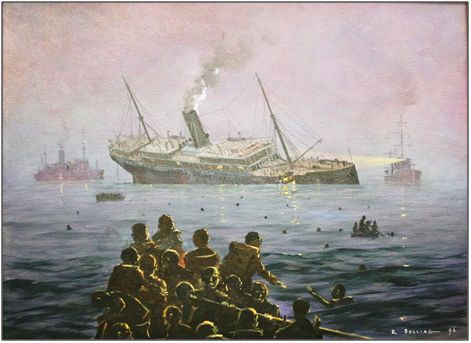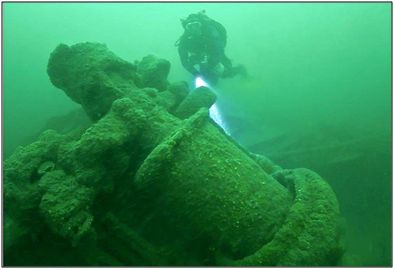


Curtain Raiser: "South Africans Versus Rommel: The Untold Story of the Desert War in World War II."
Our curtain raiser was presented by well-known professional military historian David Katz, who has presented talks to our branch on a number of occasions in the past. David's talk dealt with the challenges of getting his recently released book titled "South Africans Versus Rommel" to the marketplace.
There is a space in military history, which is hotly contested by those who produce a journalistic type of work as opposed to a more academic approach. Academics tend to speak to academics and in many instances they have abandoned the popular style military history to buffs. Hard military history is not the esteemed field that it once was in academic circles, and many university chairs remain vacant as the social sciences gain traction. However, military history remains massively popular among ordinary readers.
This book, of which a number of copies were available for purchase on the evening, attempts to bridge the academic/popular history divide and make a well-researched topic accessible. It is also a story of a journey through one of the most dynamic history faculties in South Africa, the Saldanha Military Academy. The discussion also included features from the book that highlight discoveries made during the research process which shed new light on the battles of Sidi Rezegh, Tobruk and Alamein.
Main Lecture: "At their duty's post they stood " - Poetry written by South Africans during the Great War.
The main lecture was by Kathie Satchwell and was delivered in her inimitable style. A series of slides depicting art from the Great War accompanying her lecture.
Most of the audience would have been familiar with the English poets whose writings have long been associated with the horrors and heroics of the Great War. These days we do not encounter much poetry in everyday life, but the school syllabi of those times ensured that colonial soldiers who had enjoyed/endured the benefits of an English-language education were not strangers to poems as a means of expression.
Not much had been published in South Africa but the sheer number of poems which the speaker had unearthed in newspapers, school and social and soldiers' magazines should not appear surprising. Since most, if not all, of the writers were soldiers rather than poets the emphasis was on cultural history rather than literary form.
Kathie identified several themes and divided the poetry accordingly, e.g. "motherland"; "outdoorsmen", "the voyage which all soldiers had to make", "the battles in the Woods", "nurses". She then gave typical examples to illustrate each theme - the third was exemplified by 'The Last Voyage' (by HFS, published in 1917) which was about more than just the laughing journey away from civilian life in search of adventure and heroism but also about an inward journey to a realm out of time and mind which seems to be the journey of the souls of the fallen.
Reading about the battles in the Woods - Trones, Bernafay and most of all Delville Wood - became poignant. The tragedy was that the soldiers had been sent to carry out impossible tasks with no hope of success - and then the ideals of "doing one's duty, keeping one's word, honour to one's name, establishing a good reputation or a sweet memory" came to the fore in the poems.
Another theme was that of fellowship so recently experienced by many at school on the cricket or rugby fields. Battle was seen as needing the attributes of duty, honour, team spirit, reliability; so schoolboys wrote about other schoolboys e.g. "Vale" written by John Lomax about Edward Green, both of St Andrews College.
Yet another kind of comradeship was that found in the trenches which the poet hoped might draw together all class, races, nationalities and end the divisions which had resulted in the war, as in Fellowship Recoined by O.R. Thompson in 1917.
While soldiers in the trenches wrote of trenches or mud, civilians were more likely to write about the evils of the enemy - "the fiendish Hun". Soldiers were more understanding that both friend and foe were caught up in a sacrificial dance of death. A chaplain with the South African forces used the analogies of the two angels - St Michael and St George - both invoked by the Germans and the English to slay the dragon enemy and to protect their souls, He suggested that the invocation by each side was sacrilegious - saints stand for righteousness and could not condone war between brothers.
Soldiers always had an enemy at hand - the one in charge - from corporal all the way up to General, while comic verse parodying military life must have been therapeutic.
Another theme was that of anger at the disregard given to those who marched and suffered and died in East Africa, as depicted in the last two verses of E. V. Thomas's poem "The Glory of German East". Also in German East in their thousands were the black porters about whom Chaplain Cripps wrote regretful poems, one of which is 'Change of Trumps', about how the black corpse is missing from others' poetry and from the 'whitened' rolls of honour.
Both black and white South African poets reflected African history and culture. Black poets either wrote in English or we have had to wait for translations. Recognised black South Africans wrote many poems, now translated. One lengthy poem 'The Black Army' (1915) by S E K Mqhayi is filled with imagery and, interestingly, does not draw on a South African patriotism but a uniquely African warrior tradition. An ironic twist the superior white man needing the inferior black man to help him win his wars - is found in the poem which interestingly was translated by President Thabo Mbeki.
Nimrod Makanya wrote how African recruits were extremely dissatisfied that they were not issued with firearms, while the sinking of the Mendi in 1917 gave rise to many poems including one published in 1939 - "The Mendi" by Walter M B Nhlapo.
Poems all steer clear of the depiction of the corpse - the South African poets don't write about heads blown off, hands pulped, screaming men. Soldiers who died are portrayed as roaming the no-mans-land of the front. And in the South African experience the country did not see war nor did it see battlefields and corpses.
And so memorials were built watched over by angels: "To The Memory Of Those Who Fell In France 2nd SAI."
Some poets accepted that men would return to South Africa damaged in body and mind and that peace and civilian life would be strange and difficult after the trauma of war: e.g. "Afterwards" by E. R. M. .
Many poets were angry that those who had stayed safely at home had made money whilst soldiers were without jobs - "Conquerors to Profiteers" by Sam Naishtad.
And the neglect of returning veterans in South Africa after the war was anticipated by a soldier wounded in 1916 and killed in action in 1917 - "At Delville" by Robert Ernest Vernede.
Finally another piece of doggerel:
When the battle was o'er and we counted the score
We didn't feel very victorious.
With most of our band in a far better land
Not one of us said it was glorious.
When a pal fell down dead with no top to his head
We may have used language censorious,
But whatever we said as we looked at our dead
I'm certain we never said glorious !
Former Chairman Jan-Willem Hoorweg thanked both speakers and presented them with the usual gift.
Any member wanting a photocopy of the poem sheets which were handed out to the audience can contact Joan at the letter head address.
Swartruggens battlefield tour - 10-12 August
Prof Fransjohan Pretorius to speak; Elands River Siege walk; visit to relevant cemetery.
Member Ds Stephan Botha advises that details are available on these web-sites:
https://1drv.ms/p/s!AqZnrrUJwHl0huhHcX-efr0tZHqqGg
https://shoutout.wix.com/so/8MGe2x3_?cid=0#/main
JOHANNESBURG:
CR = curtain raiser ML = main lecture
Ditsong Museum next to Zoo at 8pm
SAMHSEC:

The SS Mendi sank on the 21st of February 1917 in 20 minutes after being rammed by the SS
Darro.
607 black troops, 9 white troops and 33 crew were lost.
There were originally 805 black troops, 5 officers and 17 NCO's on board with the 33 crew.

A diver inspects the wreck of the 4 320 ton SS Mendi in 2017.
In the foreground is a cargo winch.
Branch contact details
For Cape Town details contact Johan van den Berg 021-939-7923 warbooks@mweb.co.za
For Eastern Cape details contact Malcolm Kinghorn 041-373-4469 culturev@lantic.net
For Gauteng details contact Joan Marsh 010-237-0676 joan@rfidradar.com
For KwaZulu-Natal details contact Roy Bowman 031 564 4669 bowman.roy93@gmail.com
* NOTE*
Fast mirror and backup site BOOKMARK
FOR REFERENCE Main
site * NOTE*